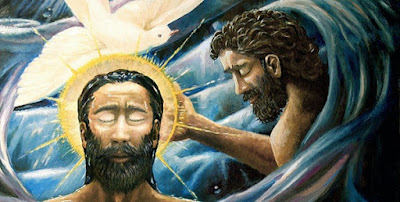JESUS GOES PUBLIC: THE BAPTISM, RITE OF SOCIAL AND COMMUNITARIAN INSERTION AND ASCENSION.
January 12, 2020: The Feast of the Baptism of the Lord - A
An Arabic proverb says, “Everything is small at the
beginning and then grows.”
In many African Traditional Societies and religious context,
there are initiation rites which are fundamental for human growth. These rites
are natural and necessary part for the insertion of an individual in the
community. Among them, these five majors: Rite of Birth and Childhood, Rite of
Adulthood, Rite of Marriage, Rite of Eldership and the Rite of Ancestorship. By
analogy, Baptism, for us Christians, would be a necessary initiation for the
growth in faith and in belonging to God. Because, through it, we get our real
identity as children of God. The Baptism of the Lord could, therefore, be seen
as one of those rites for social and communitarian insertion and ascension.
Actually, the Baptism of the Lord marks the end of Christmas
time and the beginning of the public ministry of the Lord. With Jesus, we
officially depart today from the crib of Bethlehem to go public in the streets,
market places, hills and synagogues of Jerusalem and the surrounding to
announce the good news of God’s love.
The Baptism of the Lord, together with what we celebrated
last Sunday, the Epiphany, the Wedding Feast of Cana and the Transfiguration
are the greatest moments where God’s glory appears and publicly attests of
Jesus’ identity. In this quadruple disclosure, we have a graduation of God’s
revelation and the core of Jesus' mission.
The opening antiphon of our today’s Eucharistic celebration
plunges us in the inner message of the Baptism of the Lord. It says, “After the
Lord was baptized, the heavens were opened, and the Spirit descended upon him
like a dove, and the voice of the Father thundered: This is my beloved Son,
with whom I am well pleased.”
The Baptism of the Lord we said, marks the start of Jesus
public ministry. That is well said by the Catechism, “The baptism of Jesus is
on his part the acceptance and inauguration of his mission as God's suffering
Servant. He allows himself to be numbered among sinners; he is already
"the Lamb of God, who takes away the sin of the world". Already he is
anticipating the "baptism" of his bloody death. Already he is coming
to "fulfil all righteousness", that is, he is submitting himself
entirely to his Father's will: out of love he consents to this baptism of death
for the remission of our sins” (CCC 536). We are challenged, as Christ
followers, to see in our own baptism a mandate for a mission, for a public
ministry.
The prophet Isaiah, in first reading gives the sign of what
will be the public life of Jesus. He foresees the suffering servant, the one
who came to take upon himself the pains of a suffering humanity and release
mankind from the chains. His mission will be about “bring forth justice to the
nations, not crying out, not shouting, not making his voice heard in the
street.” He will stand “as a covenant of the people, a light for the nations, to
open the eyes of the blind, to bring out prisoners from confinement, and from
the dungeon, those who live in darkness.”
Jesus, is that servant of God foreseen by Isaiah, who does
not condemn sinners, rather, take upon himself the wage of their sins. In the
second reading, Peter tells us that “God anointed him with the Holy Spirit and
power.” As such, he was invested of authority to carry out his mission, going “about
doing good and healing all those oppressed by the devil.”
The Gospel gives the narration of what took place at the Baptism
of the Lord, how the Father revealed him publicly as His only Begotten Son. Two
great lessons we can learn from this Baptism of the Lord. Firstly, this marks
the end of Jesus’ childhood life. Secondly it is the inauguration of his ministry,
his public life. Through the Baptism, the Lord grows from the Child Jesus to
the adult invested with mission and authority. All these have so implication
also on us today.
We are all baptized. We therefore became adopted children of
God, sharers in Jesus’s mission. That mission, we are urged to carry it in the
ordinary of our life as Jesus did on his time. We are called to live as people
belonging to God. Because, through the baptismal bath, we have been given a new
hope to live as children of God. But then, what do we do or what have we done of
our baptism?
This will sound sad to say, but for many Christians, Baptism
is limited to belonging to the Church. Their baptism seems to have no effect
and no impact on their public, social and ordinary life. Their faith or
belonging to God is only a matter of Sunday. On other days, they are like any
other person who does not know the Lord. Involved in corruption like any other
individual, indifferent to the needs of the poor, abusing the right of the
unfortunate, not caring about justice and righteousness. Jesus was baptized to
be made public and to take part in the suffering of his fellow citizens. He did
not hide or play the insensitive to the suffering of the poor. On the contrary,
he made his own the crosses and sorrows of the people. This will result in his
own death on the cross. It is time, brothers and sisters, that you and I
reassess our own baptism and our life in today’s world. Are we made public as
Jesus did, or are we simply nominal Christians who carry Christianity only on a
certificate? Let us never forget that our baptism gives us responsibilities in
the Church and in society.





Comments
Post a Comment